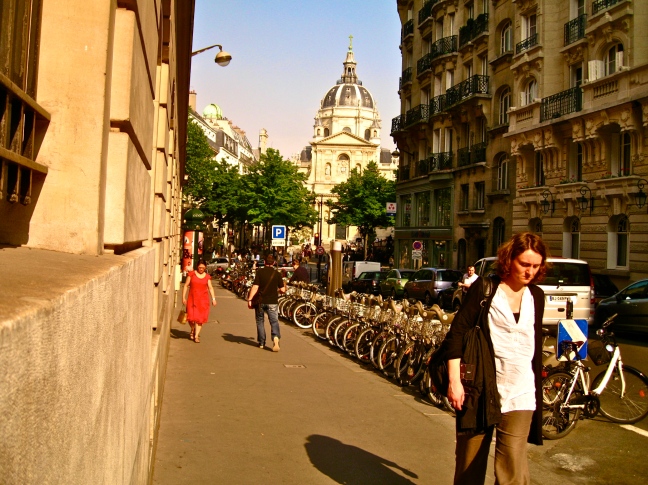When I first came back to New Zealand last year, after living abroad for six months, I found myself at university taking a Management course. Though Management was not one of my majors, I had a spare course in my schedule that needed filling. And since none of the other courses really appealed to me, I thought it worthwhile to try out a paper from another discipline.
As it turns out, my choice couldn’t have been less inspired. A course about work sounded interesting in theory, but in practice, the overabundance of theory left me in a state of despair. I was already suffering the effects of post-exchange syndrome, waking from my French dream and finding myself in a land of long-white endless clouds and rain. What I needed was a course to take my mind off the adventure I had too soon aborted, so that I wouldn’t be crippled by premature nostalgia.
But my courses that semester couldn’t have been less cheerful. My two International Business papers left me persuaded that studying international business theory is a lousy way to spend one’s undergraduate years. I mean, it is not as if I’d be calling the shots in the board room any time soon. My Italian paper was also a disappointment, although that was only because the films we were forced to analyse only served to make me think even more about the exchange from which I had just come back. The pseudo-intellectual ox-discharging of the first film, by Michelangelo Antonioni, replete with overblown existential angst, was also a major turn-off and made me question why I was taking such a course in the first place. The fact that I was watching the film in the Audio-visual library of the university, where everyone could see my watching the unprofessional soft porn scenes of Beyond the Clouds, was also extremely embarrassing. Some people spend their undergraduate years learning how to save lives; others learn how to deconstruct de-natured reality with reference to the stripped nakedness of the human condition. And no, I don’t believe a word of what I just wrote.
My Management lecturer, whose namesake was an alcoholic beverage, was what one could call a bleeding-heart liberal in the figuratively literal sense of the word. He had spent his time in academia almost worshiping the German sociologist, Max Weber, to the point that he would mention him by name in almost every lecture. For whatever reason, I am convinced that people who study Weber seriously end up embracing a really depressing vision of the world. In my final year at high school, my history teacher was also a fan of Weber; he was also an apologist for Nihilism in the bleakest sense of the word. “There are some smart people who have discovered that life is meaningless,” he once said. “Everyone else has to adhere to a belief system to make life more bearable.” It probably does not come as a surprise, then, that he considered the vast majority of people as “bozos”. If life is folly, and there’s nothing you can do about it, it is tempting to fall into despair, which he most certainly had done. If evil does not exist, and everything is permissible, what is there to stop one from committing the most selfish acts? Of course, the straight answer is that nothing stands in the way of a selfish despot pursuing their selfish interests at the expense of others. If that is the way of the world, and you cannot do anything about it, it really is no wonder he was such a state of acedia. What’s more, the Iron Cage does not paint a very pretty picture of the future. At least the Marxist has the Glorious Revolution to look forward to, even if it is to occur long after the present generation has passed away.
My Management lecturer, who I shall call ‘Vino’ here for no one’s sake other than my own, was thus the spitting image of the Nihilist professor. Vino was convinced that the world was crazy; that work conditions are only going to get worse; and that there is not really any future for students to look forward to. He also had a strong urge to go against the usual way of academics, believing them to be none other than overgrown babies. Vino thought that students should have the right to express their own opinions, and hence marked our summaries on chapters of our Work textbook according to the originality of our ideas. But at first, I didn’t understand his intention for us, and wrote a summary that basically summed up in less words the gist of the chapter. That summary, however, did not receive a good mark, which made me convinced that I was about to fail the course. “Write about your own work experience, otherwise your work will only be unsubstantialsed generalisations,” he seemed to say.
Frustrated with my mark, I decided to take a ridiculous course of action. Since I had never had a part-time job up to that point, I couldn’t exactly write about my own experiences. So I decided to write about other people’s experiences. The problem was of course that it might come across as phony; hence I chose occupations that Vino would know absolutely nothing about:
For this summary on services, I decided to explore the conditions of service work through the eyes of a Parisian security guard. I studied abroad at Paris-Sorbonne University in France earlier this year. Being the second oldest extant university in the world, Paris-Sorbonne operates from the Sorbonne, a mediaeval palace-like building in the heart of the Latin Quarter. Because of its long distinguished history, producing such well-known figures as Victor Hugo and St Thomas Aquinas, it has iconic status in French culture. Unsurprisingly, the Sorbonne is a natural tourist site, drawing the attention of literally hundreds foreigners every week. With so many tourists looking for ways to enter the building, the university has to employ at least seven security guards minding the Sorbonne at all times.
Possessing neither the skills of the ‘gendarmerie’ (‘police force’) nor the sheer upper-body strength of nightclub bouncers, Sorbonne security guards find themselves in the position of performing a demeaning and rather low-paid line of work. Nonetheless, they play a crucial role in maintaining the integrity of the building.
During my time in Paris, I got to know one security guard, who tended to the front entrance on Fridays. From talking to her, I learned there were several employer standards to which security guards are required to adhere. Although the base of their job entails letting students and staff enter the building (and on the flipside, denying permission to those unqualified to access it), they are required to appear professional at all times. This means wearing a blue uniform and dark hat, which can sometimes mislead the public into thinking they are police officers. But more critically, because their service is played in such a visibly public setting, they have to keep up the impression of looking serious. For the most part, being serious comes quite naturally because of the rather monotonous nature of their line of work. They very seldom get the opportunity to make meaningful conversation with those who inhabit the building. Most students and staff simply flash their student IDs at them at the entrance and go inside without saying much beyond the standard ‘bonjour’ or ‘bonsoir’. The superficiality of their interaction denies them the opportunity to express themselves.
In fact, the reason the security guard was happy to see me was, I suspect, because I presented her the chance to have an informal conversation. She was particularly willing to talk about the less flattering aspects of her line of work, which she couldn’t articulate to her superiors. For example, she found having to be around tourists all the time was a frustrating yet inevitable part of her workday. Guards have been trained to be assertive enough not to pander to the whims of unauthorised personnel, but their code of conduct does not explain sufficiently to them how they are to interact with tourists. While being helpful to tourists with genuine requests is an evident facet of their job, the meaning of helpfulness isn’t always clear-cut. Due to the Sorbonne’s rather misplaced reputation in the international community as the ‘Harvard of France’ (the ‘Berkley of France’ would be a more accurate comparison), crowds of tourists hang around taking photos of the entrance which they themselves cannot enter. Given the attention it attracts from snap-happy members of the public, the exclusivity of the Sorbonne is not so different from that of No. 10 Downing Street in London. Sorbonne security guards have no choice but to accept appearing in the innumerable photos that crowds of tourists take hanging around the entrance. Even if all the photographing feels like an infringement of their personal privacy, they cannot complain to the tourists seeing that the action takes place in a public setting. And in any case, no matter how frustrating or embarrassing the repeated ordeal may become, their employers wouldn’t allow them to betray their true emotions, given that the guards are the only human face of the university which members of public see. And even if security guards were in a cheerful mood, they are not supposed to have photos with tourists à la Checkpoint Charlie, however seemingly harmless the request may be.
Although, as the security guard informed me, masking true sentiments is an uncomfortable part of the job, guards cope with it because they have their shifts rotated on a continued basis. Guards only watch over the main entrance for two hours at a time because it is by far the most demanding shift. The back and side entrances do not attract nearly as much attention, being away as they are from the front entrance that faces the main road. In fact, the quietness of these entrances can mean the security guards not seeing people for stretches at a time. Guards often prefer manning these entrances because the lack of attention gives them the opportunity to engage in activities that their employers would doubtless disapprove of. Some guards would temporarily leave their assigned stations to gaze at the beautiful marble ornaments inside the building. Not having any cameras around them means being able to take a few liberties with their job without coming under any scrutiny. Guards also like having the internal shifts in which they monitor the inside of the Sorbonne. These shifts allow them to have a change of scenery from the otherwise unchanging singular view that they look at and provides them with the opportunity to stretch their legs. Guards at the entrances are required by their employers to stand at all times because sitting down would look unprofessional. But an even more delicate situation arises when they feel the urge to relieve themselves. Of course, entrance guards cannot use toilets without compromising security, so they make the most of their right while on their internal shifts.
The security guard also told me that she often has to perform tasks beyond what her employers ask of her. Her job description only requires of her to know French; but seeing the number of requests she receives from Anglophone tourists to which she has to respond, she also needs a passing knowledge of English. Sometimes the requests are innocent enough, such as when lost tourists ask for directions to the nearby Pantheon. On other occasions, tourists ask for permission to enter the building, which she has to deny, lest an intrusion compromise the security of the building. The lengths to which tourists sometimes go to gain entry permission can be staggering. While I was talking to the guard, a middle-aged man, who had been filming us with his video camera, approached the guard, claiming in English that he was about to start a Masters in Polish. When the guard informed him that the university’s language department isn’t based in the Sorbonne, but is actually in Malesherbes on the other side of the river Seine, he asked her if he could go past her anyway.
Notwithstanding the occasional rude person, most interactions that guards have with people are of a civil nature. In fact, even though guards are trained to be able to use physical force when need be, the occasions that call for it are few and far between. In this sense, the sheer ordinariness of their work draws parallels with the service that a certain young officer has to perform in Dino Buzzatti’s novel, ‘The Desert of the Tartars’. In the novel, Giovanni Drogo is stationed at a Tartar desert waiting for a barbarian horde rumoured to live beyond the desert. He has to prepare for a major event that never seems likely to happen. Likewise, Sorbonne security guards very rarely come across situations of a violent nature; yet they have to remain vigilant at all times. Violence does occasionally break out, like in 2004 when students, inspired by the anarchy of the May 1968 riots, began throwing projectiles at the Sorbonne. At such times, their work is particularly demanding due to the dilemma that they face. While they may have worked up a personal relationship with staff members and students, their professional capacity as security guards requires them to be even more thorough with checking IDs to deny the perpetrators of violence entrance into the building.
The job of Sorbonne security guards is an underappreciated one, which is why I felt the urge to shine a light on it in the hope of raising its profile and getting you to empathise with them.
—
The amazing thing is, Vino lapped it all up. I got the top mark possible for the summary. Emboldened by my efforts, I wrote equally absurd summaries for the other weeks’ readings. My facts and observations were of course highly dubious, but let’s not let facts get in the way of a good story.
The exam then came around the corner, but when it came to sitting it, something happened. For the first time ever, I went completely blank and couldn’t remember a single idea I was hoping to write about. I was sure that my mark was going to be terrible. But later on, to my surprise, I found myself with an A+. Then earlier this year, I found out that I had received a prize for the top mark in the course. It is ironic that my best mark came from a course I disliked and which bore no relation to my studies. In a way, I feel like I don’t deserve the prize I was given, but I’m not complaining. Vino was a good lecturer, and even though we never had an actual conversation, he seemed to take a liking to me. It’s funny what the written word can do to you.


